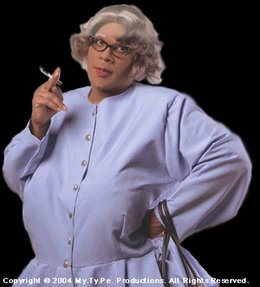
By Megan Scott
Associated Press
NEW YORK - Black America is in love with man in a dress. This one wears a wig, no bra and carries a gun. Her name is Madea, and she's a smart-talking, no-nonsense-taking, grandma-with-an-attitude.
She believes in hot grits (for more than eating), a good butt-whuppin' here and there, and telling it like it is.
The plays and movies featuring Tyler Perry's alter ego, Madea, have become box-office hits over the past several years, grossing more than $130 million, according to Forbes magazine. His latest film - Madea's Family Reunion - brought in $30 million opening weekend last month and debuted at number one.
It was a follow-up to last year's Diary of a Mad Black Woman, which drew people in hordes, shocking Hollywood movie critics.
Beyond the popularity of the character, Madea also reveals a dark side to the black community. There are real-life Madeas - black transgender people - who are ostracized by the same packs going to see Perry's plays and movies.
"This seems hypocritical that we can go to a theater and put on the glasses and don't see what we are really looking at," said Jasmyne Cannick, one of the founders of the National Black Justice Coalition, a gay, lesbian, bisexual and transgender advocacy organization. "At the end of the day, Madea is Tyler Perry in drag."
Cross-dressing for laughs is nothing new. Shakespeare relied on this trick to power the humor of Twelfth Night and As You Like It. Black men have been playing women since vaudeville and the Harlem Renaissance. In the 1970s, Flip Wilson was popular with black and white audiences as Geraldine Jones on his variety show. Wesley Snipes played a woman in To Wong Foo: Thanks for Everything, Julie Newmar in 1995. And Martin Lawrence's Big Momma's House and Big Momma's House 2 were blockbusters.
But no one is looking at these men as drag queens. Their characters are not transgendered, said Sylvia Rhue, the director of religious affairs for the National Black Justice Coalition.
Madea is drawn as a heterosexual woman, with children and grandchildren. Her husband is presumed to be dead. Black churches would welcome her into their congregation, Rhue said.
But what about Tyler Perry dressed as Madea on a daily basis? "He would have a little problem," she admits.
At the end of the day, Rhue said that the movie is not that deep.
"Tyler Perry is not playing a man who wants to be a woman," she said. "Madea is a woman in woman's clothing. People are looking at Madea as a grandmother who is very funny. We accept Tyler Perry in the role because he pulls it off. It's not a real-world situation."
There is a difference, said Richard Wesley, the head of the Rita and Burton Goldberg Department for Dramatic Writing at New York University.
In one case, a man is deliberately dressing up as a woman and using humor to point at a particular experience within the black community.
In the other a man prefers to dress as a woman and carries himself as a woman. "We don't accept that," he said.
"If Tyler Perry showed up at church dressed as Madea and is expecting people to take him seriously or is revealing himself as a transvestite, he would have a serious problem," Wesley said.
And that's the problem. When the cameras stop running, there are men still wearing dresses.
"I don't have a problem with the content of the movie," Cannick said. "My problem is with this community that embraces the idea of men playing roles as females on the screen but cannot embrace that idea in real life."
Perry did not return calls for comment. He has said that Madea is the aunt, grandmother or neighbor down the street that most black people over the age of 30 knew growing up - a woman who was loud and brash and strict, but a loving authority figure..
Cannick contends that the only reason black men, such as Lawrence, Perry and Snipes, can play these roles is because they are assumed to be heterosexual.
Vaginal Davis, a punk-rock drag performer based in Los Angeles, said that Big Momma and Madea are pure entertainment. To Davis, the characters aren't designed to give a lesson in acceptance of transgender people. The movies are escapism.
"Let's not forget," said Davis. "The mainstream black community is still extremely rigid and conservative. Individuality isn't always tolerated. ... I don't fit in any group, never have and never will, and I embrace that, and I'm treated accordingly."
Perry is currently doing the stage play Madea Goes to Jail, and a book is coming out called Don't Make a Black Woman Take Off Her Earrings: Madea's Uninhibited Commentaries on Love and Life.
Katina Parker, who works with issues for people of color for the Gay & Lesbian Alliance Against Defamation, hopes black men playing female roles will open up serious dialogue in the black community about transgender people.
"Hopefully, we will one day take it from humor to real discussion about gender identity and gender expression," she said.